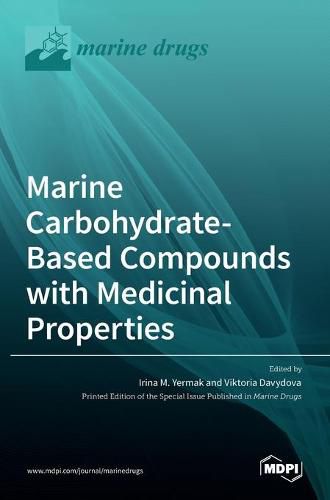Readings Newsletter
Become a Readings Member to make your shopping experience even easier.
Sign in or sign up for free!
You’re not far away from qualifying for FREE standard shipping within Australia
You’ve qualified for FREE standard shipping within Australia
The cart is loading…






This title is printed to order. This book may have been self-published. If so, we cannot guarantee the quality of the content. In the main most books will have gone through the editing process however some may not. We therefore suggest that you be aware of this before ordering this book. If in doubt check either the author or publisher’s details as we are unable to accept any returns unless they are faulty. Please contact us if you have any questions.
The marine environment is considered one of the most important sources of natural bioactive compounds with extremely rich biodiversity. Marine glycans are remarkable molecules, playing a determinant role in biological processes. Marine arbohydrate-containing substances have drawn increasing attention in the field of biomedicine for their various biological activities, such as antitumor, antivirus, hypoglycemic, immunomodulatory, and anticoagulant. These compounds obtained from marine sources, such as algae, microbes, and animals, are usually biodegradable and biocompatible, and exhibit biological properties that contribute to the discovery of a wide range of new bioactive substances with special pharmacological properties of interest to medicine. Carbohydrate-based compounds include glycans, glycoproteins, proteoglycans, glycolipids, and low-molecular and complex glycosides of differential origin. Many of the polysaccharides allow for loading lower drug dosages, which may lead to a drastic reduction of the side effects caused by the drugs. In addition, the structure of polysaccharides can be relatively easily modified in order to synthesize derivatives with desirable characteristics for drug delivery. Complexes on the basis of carbohydrates are often prepared to improve their functional properties. In this Special Issue, we seek to contribute to the discussion of various aspects of marine carbohydrate-containing compounds and provide a unique platform for a new concept for their use in medicine in order to continue to facilitate further research in this area.
$9.00 standard shipping within Australia
FREE standard shipping within Australia for orders over $100.00
Express & International shipping calculated at checkout
This title is printed to order. This book may have been self-published. If so, we cannot guarantee the quality of the content. In the main most books will have gone through the editing process however some may not. We therefore suggest that you be aware of this before ordering this book. If in doubt check either the author or publisher’s details as we are unable to accept any returns unless they are faulty. Please contact us if you have any questions.
The marine environment is considered one of the most important sources of natural bioactive compounds with extremely rich biodiversity. Marine glycans are remarkable molecules, playing a determinant role in biological processes. Marine arbohydrate-containing substances have drawn increasing attention in the field of biomedicine for their various biological activities, such as antitumor, antivirus, hypoglycemic, immunomodulatory, and anticoagulant. These compounds obtained from marine sources, such as algae, microbes, and animals, are usually biodegradable and biocompatible, and exhibit biological properties that contribute to the discovery of a wide range of new bioactive substances with special pharmacological properties of interest to medicine. Carbohydrate-based compounds include glycans, glycoproteins, proteoglycans, glycolipids, and low-molecular and complex glycosides of differential origin. Many of the polysaccharides allow for loading lower drug dosages, which may lead to a drastic reduction of the side effects caused by the drugs. In addition, the structure of polysaccharides can be relatively easily modified in order to synthesize derivatives with desirable characteristics for drug delivery. Complexes on the basis of carbohydrates are often prepared to improve their functional properties. In this Special Issue, we seek to contribute to the discussion of various aspects of marine carbohydrate-containing compounds and provide a unique platform for a new concept for their use in medicine in order to continue to facilitate further research in this area.